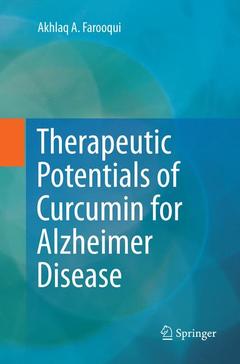Description
Therapeutic Potentials of Curcumin for Alzheimer Disease, Softcover reprint of the original 1st ed. 2016
Language: English
Subjects for Therapeutic Potentials of Curcumin for Alzheimer Disease:
Keywords
Neuroinflammation; beta amyloid; carbohydrates; oxidative; polyphenols
Therapeutic Potentials of Curcumin for Alzheimer Disease
Publication date: 04-2018
Support: Print on demand
Publication date: 04-2018
Support: Print on demand
Therapeutic Potentials of Curcumin for Alzheimer Disease
Publication date: 03-2016
402 p. · 15.5x23.5 cm · Hardback
Publication date: 03-2016
402 p. · 15.5x23.5 cm · Hardback
Description
/li>Contents
/li>Biography
/li>Comment
/li>
This is the first book on the market that explores the importance of curcumin for the treatment of neurological disorders. It has been estimated that 35.6 million people globally had dementia in 2010 and the prevalence of dementia has been predicted to double every 20 years. Thus, 115.4 million people may be living with dementia in 2050. Alzheimer?s disease (AD) is the leading cause of dementia and is present in 60%?70% of people with dementia. Unless new discoveries are made in the prevention or treatment of AD, the number of cases in the US alone is estimated to increase threefold, to 13.2 million by the year 2050. Thus, it is important to focus on delaying and treating the onset of AD by curcumin may be an important step for controlling AD. Regular consumption of healthy diet containing curcumin enriched foods, moderate exercise, and regular sleep may produce beneficial effects not only on motor and cognitive functions, but also on memory deficits that occur to some extent during normal aging and to a large extent in AD. Delaying the onset and progression of AD and improving its symptoms by few years with regular consumption of curcumin may relieve some of the burden on health care systems. In service of this goal, this volume gives readers a comprehensive and cutting edge description of the importance of curcumin for the treatment of AD in cell culture and animal models in a manner that is useful not only to students and teachers but also to researchers, dietitians, nutritionists and physicians. It can be used as supplement text for a range of neuroscience and nutrition courses. Clinicians, neuroscientists, neurologists and pharmacologists will find this book useful for understanding molecular aspects of AD treatment by curcumin.
Preface.- Effect of long term consumption of high calorie diet and calorie restriction on human health.- Neurochemical effects of long term consumption of high fat diet.- Neurochemical effects of long term consumption of simple carbohydrates.- Effects of long term consumption of animal proteins in the high calorie diet.- Effect of soft drink consumption on human health.- Contribution of salt in inducing biochemical changes in the brain.- Importance and roles of fiber in the diet.- Effects of the high calorie diet on the development of chronic visceral disease.- Effects of long term consumption of high calorie diet on neurological disorders.- Perspective and direction for future research: modification of high calorie diet needed for optimal health of human visceral and brain tissues.- Index.
Akhlaq A. Farooqui is a leader in the field of signal transduction processes, lipid mediators, phospholipases A2, glutamate neurotoxicity, phytochemicals and human health and neurological disorders. He has published cutting edge research on the role of phospholipases A2 in signal transduction processes, generation and identification of lipid mediators during neurodegeneration by lipidomics and has studied the involvement of glycerophospholipid, sphingolipid and cholesterol-derived lipid mediators in kainic acid neurotoxicity, an experimental model of neurodegenerative diseases.
Provides current and comprehensive information on the effects of curcumin in a brain affected by Alzheimers disease Explores a unique topic in the field of neurochemistry and neuroscience Explores the relation of signal transduction processes to the pathogenesis of Alzheimer's Disease and modulation of pathogenic changes by curcumin Includes supplementary material: sn.pub/extras
© 2024 LAVOISIER S.A.S.




